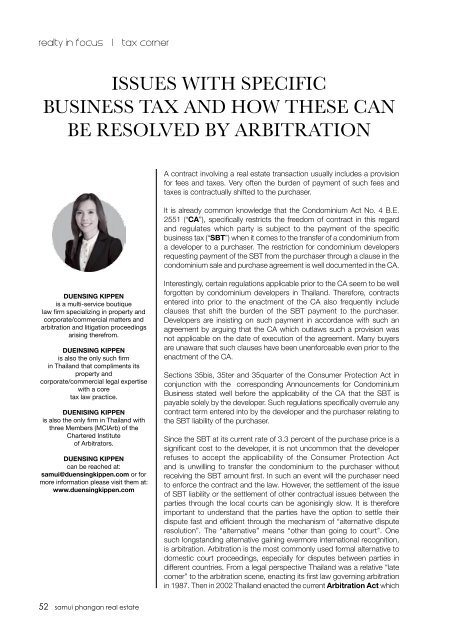Samui Phangan Real Estate Magazine February-March
You also want an ePaper? Increase the reach of your titles
YUMPU automatically turns print PDFs into web optimized ePapers that Google loves.
ealty in focus l tax corner<br />
ISSUES WITH SPECIFIC<br />
BUSINESS TAX AND HOW THESE CAN<br />
BE RESOLVED BY ARBITRATION<br />
DUENSING KIPPEN<br />
is a multi-service boutique<br />
law firm specializing in property and<br />
corporate/commercial matters and<br />
arbitration and litigation proceedings<br />
arising therefrom.<br />
DUEINSING KIPPEN<br />
is also the only such firm<br />
in Thailand that compliments its<br />
property and<br />
corporate/commercial legal expertise<br />
with a core<br />
tax law practice.<br />
DUENISING KIPPEN<br />
is also the only firm in Thailand with<br />
three Members (MCIArb) of the<br />
Chartered Institute<br />
of Arbitrators.<br />
DUENSING KIPPEN<br />
can be reached at:<br />
samui@duensingkippen.com or for<br />
more information please visit them at:<br />
www.duensingkippen.com<br />
52 samui phangan real estate<br />
A contract involving a real estate transaction usually includes a provision<br />
for fees and taxes. Very often the burden of payment of such fees and<br />
taxes is contractually shifted to the purchaser.<br />
It is already common knowledge that the Condominium Act No. 4 B.E.<br />
2551 (“CA”), specifically restricts the freedom of contract in this regard<br />
and regulates which party is subject to the payment of the specific<br />
business tax (“SBT”) when it comes to the transfer of a condominium from<br />
a developer to a purchaser. The restriction for condominium developers<br />
requesting payment of the SBT from the purchaser through a clause in the<br />
condominium sale and purchase agreement is well documented in the CA.<br />
Interestingly, certain regulations applicable prior to the CA seem to be well<br />
forgotten by condominium developers in Thailand. Therefore, contracts<br />
entered into prior to the enactment of the CA also frequently include<br />
clauses that shift the burden of the SBT payment to the purchaser.<br />
Developers are insisting on such payment in accordance with such an<br />
agreement by arguing that the CA which outlaws such a provision was<br />
not applicable on the date of execution of the agreement. Many buyers<br />
are unaware that such clauses have been unenforceable even prior to the<br />
enactment of the CA.<br />
Sections 35bis, 35ter and 35quarter of the Consumer Protection Act in<br />
conjunction with the corresponding Announcements for Condominium<br />
Business stated well before the applicability of the CA that the SBT is<br />
payable solely by the developer. Such regulations specifically overrule any<br />
contract term entered into by the developer and the purchaser relating to<br />
the SBT liability of the purchaser.<br />
Since the SBT at its current rate of 3.3 percent of the purchase price is a<br />
significant cost to the developer, it is not uncommon that the developer<br />
refuses to accept the applicability of the Consumer Protection Act<br />
and is unwilling to transfer the condominium to the purchaser without<br />
receiving the SBT amount first. In such an event will the purchaser need<br />
to enforce the contract and the law. However, the settlement of the issue<br />
of SBT liability or the settlement of other contractual issues between the<br />
parties through the local courts can be agonisingly slow. It is therefore<br />
important to understand that the parties have the option to settle their<br />
dispute fast and efficient through the mechanism of “alternative dispute<br />
resolution”. The “alternative” means “other than going to court”. One<br />
such longstanding alternative gaining evermore international recognition,<br />
is arbitration. Arbitration is the most commonly used formal alternative to<br />
domestic court proceedings, especially for disputes between parties in<br />
different countries. From a legal perspective Thailand was a relative “late<br />
comer” to the arbitration scene, enacting its first law governing arbitration<br />
in 1987. Then in 2002 Thailand enacted the current Arbitration Act which





